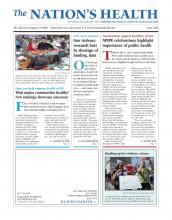Every day, kids hear messages about body image. From TV shows to magazines to friends and family, kids soak up a lot of messaging about what makes for a “good” body. And sometimes, those messages can be harmful.
You can’t always shield your kids from the negative body talk that surrounds them. But you can help them develop a healthy body image, giving them self-confidence and an appreciation of their bodies.
“Kids, and especially teens, cannot avoid exposure to messages that can negatively impact body image, but they can start to be more aware of the messages and build up a resilience to them,” says Natalie Digate Muth, MD, MPH, RD, FAAP, spokesperson for the American Academy of Pediatrics.
It’s possible to help kids feel good about themselves and their bodies while also encouraging healthy behaviors. You can help your kids learn to recognize unrealistic body expectations and focus instead on treating their bodies well.
Encouraging healthy body image for your kids may start with taking a look at your own behavior. Making an offhand remark about your own body or eating habits might not seem like a problem, but it could be for your child.
“Kids pay attention to the things you say, even if they seem harmless,” Muth says.
If you make negative comments about your appearance, your child could be picking up on what you say and directing that body insecurity toward herself or himself. Be mindful of the language that you use to talk about yourself and encourage your kids to speak positively about their bodies.
No matter your age, it’s easy to fall into the trap of comparison and body shaming. Kids aren’t immune from this kind of behavior, which can make them feel like they have to change themselves to fit a certain ideal body type.
If your child makes comments about what an ideal body looks like based on what she or he sees in the media, you can open up a conversation about healthy, realistic body image. You can also remind your kids that there are many different types of bodies that are healthy, even if there isn’t usually much diversity in popular culture.

Images courtesy iStockphoto: Superhero girl by Choreograph
“(Parents) can help kids recognize that models (in magazines) and actors in TV shows and movies have lots of makeup and work done and photo and video editing…so that they look ‘perfect,’” Muth said. “That is not real life.”
Food is another tricky topic when it comes to supporting healthy body image. While it’s important that you encourage your family to eat nutritious food, you also don’t want your kids to have a relationship with food that’s based on shame. Make sure that your kids are getting enough to eat and are regularly eating well-balanced meals.
“Model a healthy relationship with food,” Muth says. “Model eating for hunger and fullness and to be healthy.”
She also encourages parents to avoid using food as a reward or to cope with tough times. And if your kids do get off track with eating healthy, help them return to good habits without any blame. You can make it easier for your kids to choose nutritious food by making them easily accessible, Muth adds.
It’s important for your kids to be reminded that there’s so much more to bodies than their appearance. People talk a lot about what our bodies look like, but not as often about all the amazing things that bodies can do.
“A healthy body image is having an overall positive view of one’s body and pride in its capabilities and strength,” Muth says.
Encouraging physical activity is not only necessary for overall health, but it’s also another way for you and your family to celebrate your bodies for what they can do — not just what they look like. Make exercise fun with new activities and challenges
“Parents can help their children engage in experiences that show them their strength and what their body can accomplish,” Muth says. “Training for and completing a 5K or climbing a challenging mountain or learning a new physical skill helps to build strength and confidence.”
There is a lot of pressure for kids and adults alike to strive for an ideal body. While eating a healthier diet and exercising on a regular basis is generally not harmful, doing anything to the extreme can be dangerous. Talk to your kids about the risks of diet and exercise regimens that haven’t been recommended for them by a medical professional.
Be sure to listen to your kids’ thoughts surrounding body image, food and exercise and talk to a health professional if you have concerns, Muth says.
Find more ways to give praise
Be mindful of the compliments that you give your kids. Muth encourages parents to consider praise that’s focused on children’s traits, qualities and skills that aren’t just about their physical appearance.
Has your child shown generosity, courage, responsibility, creativity or some other positive trait? Let them know you’ve noticed. Recognize them for the everyday ways they excel as well as for their big accomplishments.
After all, the way we look is just one small part of who we are.
- Copyright The Nation’s Health, American Public Health Association









